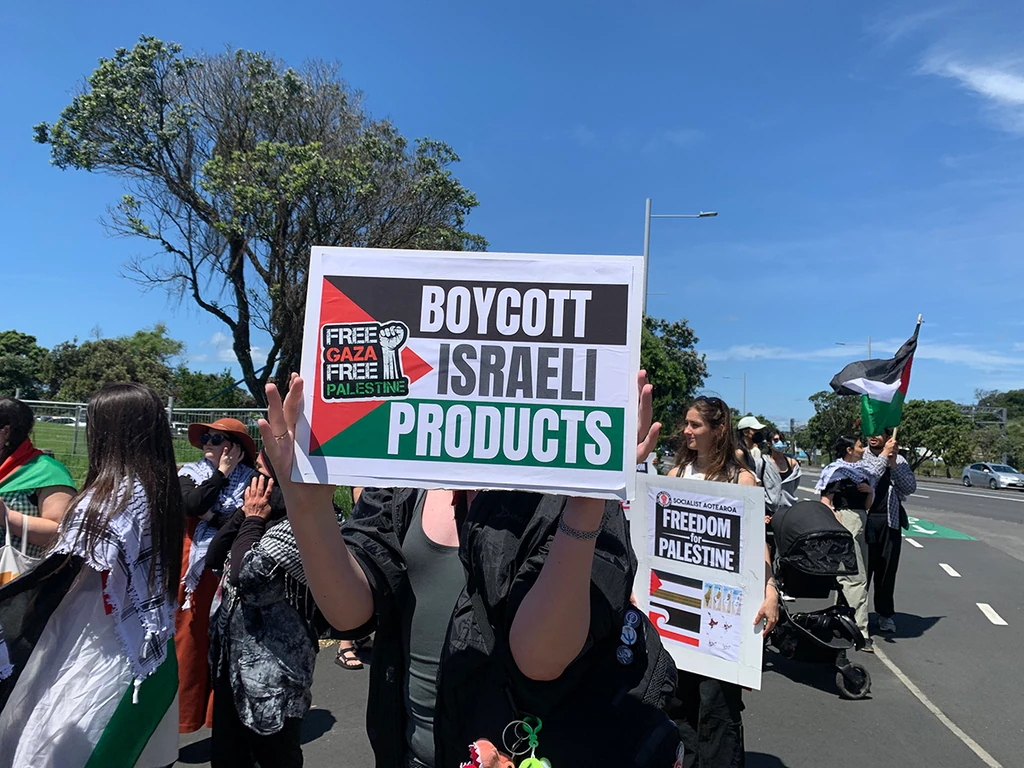Boycott Israel. For justice, for human rights, for Palestine.
Join the global movement. Discover how your boycott makes a difference.
Understanding the Reasons for the Boycott

Occupation and Colonization:
Illegal colonization of Palestinian territories in violation of international law.

Apartheid and Discrimination:
System of institutionalized discrimination against Palestinians.

How to Boycott? (BDS Guide)
The movement to boycott Israel is most commonly associated with the BDS movement. BDS stands for Boycott, Divestment, and Sanctions. It is a global non-violent movement initiated by Palestinian civil society in 2005.
01
Products to Boycott:
List of brands and companies that support the Israeli occupation." (e.g., SodaStream, HP, AXA, Sabra...). Present as a clear list with logos.
02
Ethical Alternatives:
Support these alternatives and Palestinian products. (e.g., olive products from Palestine, coffee...).
03
Cultural & Academic Boycott:
Information on boycotting complicit cultural and academic institutions.
What We Aim to Achieve
Recude Illegal Settlements
Advocate for actions that decrease the number of illegal settlements in the West Bank.
Harmony and Peace for All
Support actions that promote peace, dialogue, and reconciliation between Israel and Palestine.
No to the Israely Apartheid
Promote a future without apartheid in Israel, advocating for equality and justice for all.

Testimonials about the effectiveness of the BDS movement
For years, our student union debated the issue of Palestine, but it felt like we were just talking in circles. When we learned our university's endowment fund was invested in companies providing technology for the occupation, we knew we had to act. The BDS movement gave us a clear, strategic, and non-violent framework to turn our discussions into tangible action.
We started a multi-year campaign: educating peers, holding teach-ins, and finally pushing for a referendum on divestment. It was tough—we faced intense opposition and misinformation campaigns. But the BDS principles provided a solid moral foundation. Last year, we won the vote. Our university committed to divesting from those specific companies. It was a small victory in the grand scheme of things, but it proved that sustained, principled pressure works. BDS showed us that as students, we aren't powerless; we can hold institutions accountable and force them to align their investments with their stated ethical values.

Léa Dubois
Montreal, Canada. University Student & Organizer with "Students for Ethical Investment"
As an artist, I've always believed in the power of cultural exchange to build bridges. However, I also believe in standing against injustice. I was invited to perform at a government-sponsored festival in Israel. It was a lucrative offer and professionally tempting. But I did my research, prompted by the cultural boycott call from BDS. I learned about the complex system of discrimination and how these cultural events are often used to whitewash or 'art-wash' the ongoing oppression of Palestinians.
I made the difficult decision to decline the invitation. I publicly stated my reasons, citing the BDS call for a cultural boycott. The backlash was immediate and harsh from some quarters, but the outpouring of support from fellow artists and human rights advocates was overwhelming. My statement sparked conversations within my industry that simply weren't happening before. It wasn't about rejecting Israeli people or artists; it was about refusing to be used as a tool by a state that violates international law. BDS gave me a way to translate my solidarity into a meaningful, impactful action that resonated far beyond a single performance.

Migel. N
Barcelona, Spain. Musician & Film Producer
